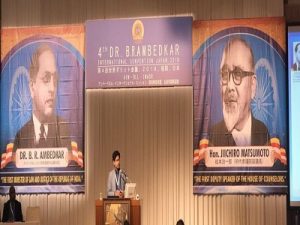At Japan Convention, Dalit and Burakumin People Forge Solidarity
While the media is still abuzz with stories of the World Hindu Congress that was organised in Chicago last month, a lesser discussed, yet important event took place in the history of Dalit and Burakumin peoples’ struggle. In a historic convention, the two oppressed outcaste groups of India and Japan discussed issues ranging from land rights to education and gender.
In a packed 300-capacity hall, the fourth Dr. B.R. Ambedkar International Convention was organised on September 22-23 at Fukuoka Prefecture, a southwest coastal region of Japan. The event was co-organised by the Ambedkar International Mission (AIM), Japan, Buraku Liberation League (BLL) and International Movement Against All Forms of Discrimination (IMADR), Japan. It was supported by AIM Global and 17 country units of AIM.
A brain child of AIM founder Raju Kamble (1954-2018), the joint Dalit-Burakumin conference was initiated three years ago. After his passing, the AIM Japan team led by Sushant Godghate organised the 2018 convention.
The delegation in the hall was geographically diverse, with representation from over eight countries. The convention was inaugurated by the Fukuoka Prefecture’s governor Hiroshi Ogawa. BLL president Shigeyuki Kumisaka delivered the opening address, along with chief executive committee member Sen-Ichi Moriyama. The conference began by paying tributes to the two departed leaders of Dalit and Burakumin struggles: Raju Kamble and Matsumoto-Ryu, who was a member of the house of representatives. Their life size portraits hung on the wall alongside Ambedkar’s and Matsumoto Jiichirō, the formidable leader of the Buraku people.
Cultural performances of Japanese Taiko, a drum performance and Indian bheem-geet dance marked the beginning of conference. The Indian delegates also offered a Buddha Vandana.
The historic convention attracted Japanese and Indian media. Nagpur based, Dalit-owned enterprise AwaazIndia TV telecast the programme live to over 50,000 viewers across the world. The papers presented at the conference discussed wide-ranging issues from land rights of Dalits, education and student politics of Dalits, tribal issues, comparative African American experiences, gender issues in Japan and India, condition of Dalit Christians around the world, to the issues central to Japanese politics, judiciary and black capitalism with live translation of speeches in English and Japanese.
Dalits and Burakumins
It is not a well-known fact that the Japanese elite harboured ill-will towards fellow citizens, downgrading them to the status of outcaste. The Burakumin, literally translated as “the ones who live in hamlets”, have been subject to severe discrimination and ostracisation at the hands of Japanese people since the 17th century, prominently seen in the Edo period.
Dalits and Burakumin share experiences of caste suffering, albeit placed in different geographies and religious orders, their social ranking was reduced to an “untouchable” status. They were forced into occupations considered lowly such as tanning leather, cleaning filth and animal slaughter. In the present times, the two groups face discrimination in accessing job markets. Their issues are far too similar to ignore and too obvious to overlook comparisons.
That is why the former general secretary of the All India Scheduled Caste Federation P.N. Rajbhoj, during his visit to Japan to attend the World Buddhist Conference in Kyoto, had briefly met with the leader of the Buraku people, Matsumoto Jiichirō, the father of the Buraku liberation league and vice-chairman of the house of councillors. In a letter, Rajbhoj discussed the possibilities of inviting Ambedkar to Japan. After the conference, Rajbhoj visited Buraku Mondai Kenkyusho and stayed at Asada Zennosuke’s house, one of the foremost activists of the BLL. On his visit to India, Jiichirō called on Ambedkar for a meeting. The meeting was scheduled for 10 minutes, but lasted over 40.
Their issues are far too similar to ignore and too obvious to overlook comparisons.
This rich legacy could not be further tapped either by the Dalit or Buraku liberation struggles. However, the AIM has reestablished the connection. Representation of the BLL became a regular occurrence in international Ambedkar conventions. Drawing upon the works of their leaders, the Dalits and Burakumins forged an international solidarity alliance.
However, the stigma attached to both the groups put them on defensive. The Burakumins, like Dalits, are unwilling to openly identify as Burakumins. They are subject to segregation, hatred and discrimination by the mainstream society. They suffer discrimination in housing and in leading a dignified life. Buraku, like Dalit, is a marked category which is damned as the “wretched of the earth”.
Drawing on this brotherly oppression, the convention jointly passed 12 resolutions. These included:
1) advocating for the rights of Dalits and Burakumin with a concentrated UN-based lobbying strategy at the UN-SDG,
2) supporting research based projects and university collaborations,
3) calling on the UN to “appoint an independent office with dedicated resources to investigate the practice of untouchability and caste based discrimination”,
4) emphasising the importance of strengthening social media platforms,
5) demanding the release of incarcerated oppressed class prisoners,
6) urging to building platforms for women of both groups to interact on regular basis,
7) condemning the on-going war in Yemen, Iraq, Egypt, Syria, Libya by the imperial powers and taking on the “Modi government’s onslaught on the Dalit, Tribal and minority groups” and
8) extending solidarity to “global oppressed groups” by developing “networks of Blacks, Roma, Indigenous & natives, Refugees, other ethnically and economically deprived communities with the Dalits and Burakumin struggle”, while honouring the legacies of Jyotiba and Savitri Phule, Ambedkar and Matsumoto Jiichirō.
The two day conference concluded with a slogan. When the announcer greeted with “Jai Bhim” the audience replied with a roaring “Jai Burakumin”, amidst thundering claps to the Dalit-Burakumin sloganeering.
Source: The Wire






